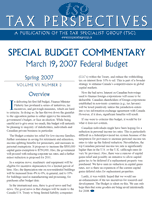
PDF Format
 Issue Contents Issue Contents
 All Issues All Issues
Spring 2007
Volume 7, Number 2
SPECIAL BUDGET COMMENTARY
March 19, 2007 Federal Budget
International
The Budget contains a surprisingly long list of international measures, many of which have been laid out in great detail. U.S. Limited Liability Companies (LLC's) It has become increasingly common for U.S. businesses to invest in Canada through LLC's. Also, Canadians doing business in the U.S. frequently use LLC's. Sometimes this is the only vehicle available to them. Because LLC's are, in general, not taxable entities in the U.S. (rather, the income is assessed to the owner of the LLC, and not the LLC itself), various complications arise for Canadian tax purposes. Firstly, LLC's currently do not get the benefit of the Canada-U.S. Treaty. This means that the withholding tax rate on payments from Canada to a U.S. LLC may be 25%, instead of the rate provided under the Treaty (5% or 10% would be typical). Secondly, U.S. LLC's are subject to capital gains tax in Canada where a U.S. individual or a U.S. corporation would be exempt. The list of other complications and problems is extensive. Under the budget proposals, Canada will move to amend the Canada-U.S. Treaty to recognize U.S. LLC's for treaty benefits. This will eliminate the problems above, make LLC's more attractive to Canadians, and make Canadian investments more suitable for U.S. LLC's. Withholding Tax on Interest To make the Canadian financial marketplace more competitive internationally, all withholding on interest payments between Canada and the U.S. will be eliminated. Canada will also move to exempt from withholding tax all arm's length interest payments to non-residents. Foreign Corporations Canadian corporations that have international subsidiaries are currently subject to a complex series of rules when profits are repatriated to Canada. If the foreign subsidiary carries on an active business, no tax is paid in Canada until funds are repatriated by way of dividends. Then, if the foreign affiliate carries on business in a country with which Canada has an international tax treaty, the dividend received by the Canadian parent company will be tax-free. Otherwise, the dividend is taxable at that time. Canadian companies frequently borrow in Canada to invest in shares of foreign subsidiaries. The interest is deductible in Canada, even though dividends received in the future may be exempt of tax. It is proposed that this advantage be eliminated for arm's length borrowings after 2009, and for existing arrangements that are non-arm's length after 2008. For new borrowings made on or after March 19, 2007, the interest will be non-deductible commencing in 2008. Industrialized countries are becoming increasingly concerned with the proliferation of tax havens, particularly where secrecy is involved. Accordingly, Canada will move to deem all income earned in a non-treaty country to be passive income, regardless of its actual nature, unless such a country has entered into an international tax treaty or a Tax Information Exchange Agreement (TIEA). This may cause a Canadian shareholder to have to report the income even if it has not been received. Countries will be given at least five years to enter into a TIEA once negotiations start. However, if the agreement is not concluded by that time, then the new passive income rule will start to apply. While this measure has a big stick associated with it, it also comes with a carrot. If a country does enter into a TIEA, then active business income will be considered to be exempt surplus, eligible for tax-free repatriation to a Canadian corporate shareholder in certain cases. A number of tax havens have already entered into information exchange agreements with countries such as the U.K. and the U.S. It is to be expected that such countries and others will readily enter into such agreements with Canada. This will create a new landscape in the international arena, allowing Canadian companies the ability to set up subsidiaries in countries with no income tax (e.g., possibilities may include Bermuda, the Bahamas, and the Cayman Islands), while enjoying the ability to repatriate funds to Canada free of tax. At present, this privilege is limited to tax treaty countries where, with the notable exception of Barbados, the tax rate will be 10% or higher. Foreign Investment Entity Rules Lastly, draft legislation containing amendments to the taxation of non-resident trusts and foreign investment entities (FIE's) was released in 2006, with these rules to become applicable in 2007. The rules were originally to apply commencing January 1, 2003 and had their origin in the 1999 Federal Budget. These measures are still pending. At the conclusion of the budget documents there is a list of measures that the government intends to pursue. These rules are not included in the list. Also, any objective analysis of the FIE rules will readily conclude that these rules penalize Canadians wishing to invest in foreign investment markets, particularly through foreign mutual funds. It is therefore possible that the government may be reconsidering whether to move forward with these rules. On this, we will have to wait and see (and hope).
|